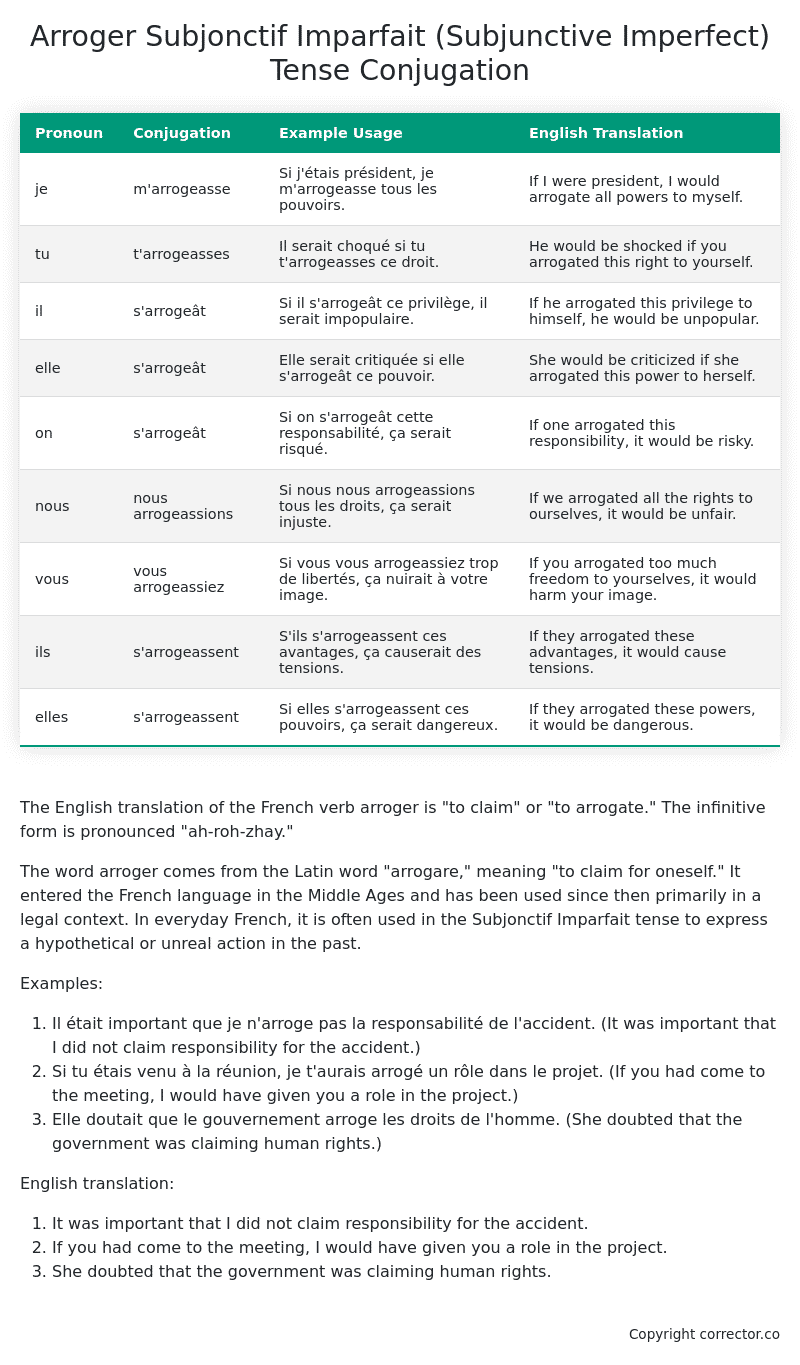Subjonctif Imparfait (Subjunctive Imperfect) Tense Conjugation of the French Verb arroger
Introduction to the verb arroger
The English translation of the French verb arroger is “to claim” or “to arrogate.” The infinitive form is pronounced “ah-roh-zhay.”
The word arroger comes from the Latin word “arrogare,” meaning “to claim for oneself.” It entered the French language in the Middle Ages and has been used since then primarily in a legal context. In everyday French, it is often used in the Subjonctif Imparfait tense to express a hypothetical or unreal action in the past.
Examples:
- Il était important que je n’arroge pas la responsabilité de l’accident. (It was important that I did not claim responsibility for the accident.)
- Si tu étais venu à la réunion, je t’aurais arrogé un rôle dans le projet. (If you had come to the meeting, I would have given you a role in the project.)
- Elle doutait que le gouvernement arroge les droits de l’homme. (She doubted that the government was claiming human rights.)
English translation:
- It was important that I did not claim responsibility for the accident.
- If you had come to the meeting, I would have given you a role in the project.
- She doubted that the government was claiming human rights.
Table of the Subjonctif Imparfait (Subjunctive Imperfect) Tense Conjugation of arroger
| Pronoun | Conjugation | Example Usage | English Translation |
|---|---|---|---|
| je | m’arrogeasse | Si j’étais président, je m’arrogeasse tous les pouvoirs. | If I were president, I would arrogate all powers to myself. |
| tu | t’arrogeasses | Il serait choqué si tu t’arrogeasses ce droit. | He would be shocked if you arrogated this right to yourself. |
| il | s’arrogeât | Si il s’arrogeât ce privilège, il serait impopulaire. | If he arrogated this privilege to himself, he would be unpopular. |
| elle | s’arrogeât | Elle serait critiquée si elle s’arrogeât ce pouvoir. | She would be criticized if she arrogated this power to herself. |
| on | s’arrogeât | Si on s’arrogeât cette responsabilité, ça serait risqué. | If one arrogated this responsibility, it would be risky. |
| nous | nous arrogeassions | Si nous nous arrogeassions tous les droits, ça serait injuste. | If we arrogated all the rights to ourselves, it would be unfair. |
| vous | vous arrogeassiez | Si vous vous arrogeassiez trop de libertés, ça nuirait à votre image. | If you arrogated too much freedom to yourselves, it would harm your image. |
| ils | s’arrogeassent | S’ils s’arrogeassent ces avantages, ça causerait des tensions. | If they arrogated these advantages, it would cause tensions. |
| elles | s’arrogeassent | Si elles s’arrogeassent ces pouvoirs, ça serait dangereux. | If they arrogated these powers, it would be dangerous. |
Other Conjugations for Arroger.
Le Present (Present Tense) Conjugation of the French Verb arroger
Imparfait (Imperfect) Tense Conjugation of the French Verb arroger
Passé Simple (Simple Past) Tense Conjugation of the French Verb arroger
Passé Composé (Present Perfect) Tense Conjugation of the French Verb arroger
Futur Simple (Simple Future) Tense Conjugation of the French Verb arroger
Futur Proche (Near Future) Tense Conjugation of the French Verb arroger
Plus-que-parfait (Pluperfect) Tense Conjugation of the French Verb arroger
Passé Antérieur (Past Anterior) Tense Conjugation of the French Verb arroger
Futur Antérieur (Future Anterior) Tense Conjugation of the French Verb arroger
Subjonctif Présent (Subjunctive Present) Tense Conjugation of the French Verb arroger
Subjonctif Passé (Subjunctive Past) Tense Conjugation of the French Verb arroger
Subjonctif Imparfait (Subjunctive Imperfect) Tense Conjugation of the French Verb arroger (this article)
Subjonctif Plus-que-parfait (Subjunctive Pluperfect) Tense Conjugation of the French Verb arroger
Conditionnel Présent (Conditional Present) Tense Conjugation of the French Verb arroger
Conditionnel Passé (Conditional Past) Tense Conjugation of the French Verb arroger
L’impératif Présent (Imperative Present) Tense Conjugation of the French Verb arroger
L’infinitif Présent (Infinitive Present) Tense Conjugation of the French Verb arroger
Struggling with French verbs or the language in general? Why not use our free French Grammar Checker – no registration required!
Get a FREE Download Study Sheet of this Conjugation 🔥
Simply right click the image below, click “save image” and get your free reference for the arroger Subjonctif Imparfait tense conjugation!

Arroger – About the French Subjonctif Imparfait (Subjunctive Imperfect) Tense
Formation
Common Everyday Usage Patterns
Interactions with Other Tenses
Subjonctif Présent
Indicatif Passé Composé
Conditional
Conditional Perfect
Summary
I hope you enjoyed this article on the verb arroger. Still in a learning mood? Check out another TOTALLY random French verb conjugation!


